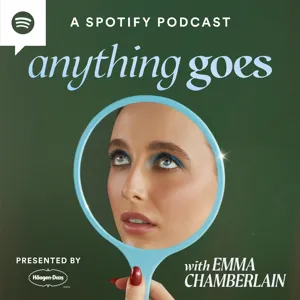Podcast Summary
Exploring self-care, relationships, and personal growth in our 20s: Maintain dental health with toothpaste and mouthwash, acknowledge life changes, and prioritize self-care, relationships, and personal growth in our 20s
Taking care of our health, specifically our teeth and overall well-being, is essential, especially during our 20s. The neglect of our teeth can lead to irreversible damage, making it crucial to use toothpaste and mouthwash like Pronamel, which repair acid-weakened enamel. Kroger brand products offer quality at affordable prices, allowing us to make wise choices for our families. Indulging in simple pleasures, like Keebler Sandy's cookies, can make our moments special. The psychology of our 20s is marked by significant life changes and transitions, and it's essential to acknowledge and address these shifts. As a podcast, we aim to explore these topics and provide valuable insights. A heartfelt thank you to our new and returning listeners for your support and engagement. This week, we delve into the importance of self-care, relationships, and personal growth during our 20s. Don't miss out on the engaging discussions and practical advice. Stay tuned!
Making French friends in your 20s during pandemic: Despite pandemic challenges, remember it's okay to reach out, join new groups, and take things at your own pace to make French friends in your 20s.
Making French friends in your 20s can be a challenging experience, especially during and after the pandemic. Many people feel isolated and lonely as they enter adulthood and lose touch with old friends. This is a common feeling and is made worse by the comparison culture perpetuated through social media. It's important to remember that the lives presented on social media are not the whole truth and that everyone is going through their own unique experiences. The pandemic has had a long-lasting impact on our ability to socialize and make new friends, but it's important to remember that you're not alone in feeling this way. Reach out to others, join new social groups, and remember that it's okay to take things at your own pace. You're not doing anything wrong, and there are likely many others out there who are feeling the same way.
Navigating Friendships in Adulthood: Despite the challenges of making new friends in adulthood, remember you're not alone in feeling isolated and lonely. Recognize the shifts and find ways to build new communities and meet people you truly connect with.
Making new friends in adulthood can be a challenging experience, especially in larger cities or metropolitan areas where it may feel like everyone else already has their established groups. This struggle is not unique, as many of us experience significant lifestyle changes and shifts in friendship dynamics as we enter adulthood. Our college or high school friendships, which were once convenient and easy to form, become more difficult to maintain as we move to new places and encounter diverse backgrounds and experiences. The large number of people we are suddenly surrounded by can be overwhelming, and the places we once called home no longer fit the identities we had when we first moved there. However, it's important to remember that the universality of this struggle means that we are not alone in our feelings of isolation and loneliness. By recognizing these shifts and the challenges they bring, we can begin to identify ways to build new communities and meet people we truly relate to.
Changes in our 20s lead to fewer friends: Despite the challenges of maintaining friendships during our 20s, it's natural to make new connections as we grow and change.
The decade of our 20s is a time of significant change, leading to the decline in the quantity of friends many people have. This is due in part to the high rate of moving during this time, making it harder to maintain old connections. Additionally, people enter relationships, begin full-time work, and experience exhaustion, limiting their social energy. As we grow and change, our values and interests may no longer align with our old friends, leading to feelings of isolation. However, it's important to remember that it's normal to outgrow people and that making new friends is a natural part of life. As social creatures, we have an innate desire to connect with others and form deep, lasting friendships.
Social Interaction is Essential for Well-being: Lack of social connections negatively impacts mental and physical health, explore practical ways to improve relationships, and remember it takes time and effort to build and maintain connections.
Social interaction is as essential to our well-being as a balanced diet, adequate sleep, and stress management. The lack of fulfilling social connections can lead to negative impacts on both mental and physical health, as shown in studies with lab rats. Feeling isolated and lonely can even trigger neural responses similar to physical pain or extreme grief. It's important to remember that struggling with friendships in adulthood is a common experience, but it's also something that can be addressed. Instead of focusing on the negative, it's helpful to explore practical ways to improve social connections. This can include joining clubs or groups, volunteering, or engaging in activities that align with personal interests. Building and maintaining relationships takes time and effort, but the benefits to overall health and happiness are worth it.
Embrace loneliness to make authentic friendships: To make authentic friendships in your 20s, learn to be comfortable with being alone, build a strong relationship with yourself, and prioritize self-care and introspection.
Making friends in our 20s can be a challenging psychological journey, often marked by fear and insecurity. To overcome this, it's crucial to learn to be comfortable with being alone. Embracing your loneliness and building a strong relationship with yourself is essential for making authentic friendships. Prioritize spending time alone, focusing on self-care and introspection, and learning to enjoy your own company. By doing so, you'll become more confident and secure, making it easier to form deeper connections with others. Remember, no relationship can completely fulfill your friendship needs, and trying to distract yourself with shallow friendships or constant socializing may only increase your fear of loneliness. Instead, view alone time as a rare opportunity to recharge and strengthen your bond with yourself.
Expand social circle beyond waiting: Leverage casual connections, ask for intros, message new contacts, build friendships through work, commit to regular activities
Expanding your social circle goes beyond just waiting for people to come to you. Leveraging casual connections and reaching out to people you've met once or twice can lead to deep friendships. This can be done by asking mutual friends for introductions or even messaging someone you've met at a party. Work connections are also valuable in building a community and making friends. Committing to a regular activity or hobby is a practical way to meet new people and stay committed to making new connections. Remember, it takes time to build deep friendships, so be patient and persistent.
Meeting new people through regular activities: Regularly attending activities and hobbies is a superior way to form friendships compared to making instant connections. Intent and commitment are key in building relationships and using social media can help stay connected.
Committing to a regular activity or hobby is an effective way to meet new people and form meaningful friendships. According to the speaker, this method is superior to trying to make instant connections, as it allows time for shared interests and commonalities to emerge. The speaker shares personal experiences of making friends through regular attendance at classes, such as boxing, climbing, and life drawing. They emphasize the importance of intent and commitment in building relationships, and suggest using social media like Instagram to stay connected with new acquaintances. The speaker also emphasizes the importance of actively putting oneself out there and not relying on the belief that friendships will just happen organically. They cite a study that suggests believing friendships take effort is associated with less loneliness and a greater sense of connection.
Investing time in relationships: Be intentional about friendships, put effort in, don't rush, and embrace vulnerability to build deeper connections.
Building meaningful relationships takes time and deliberate effort. My friend once shared that the best friendships and relationships are those that are invested in and take time to grow. It's important to be intentional about the people we surround ourselves with and not rush into friendships. Additionally, putting ourselves out there and having conversations with new people, even if it's awkward at first, can lead to engaging experiences and the opportunity to practice being vulnerable. Ultimately, we are in control of our social world and who we choose to have in it. By being intentional and embracing the idea that we have the power to make connections, we can reap the rewards of deeper, more meaningful relationships. Furthermore, research shows that our perceptions of social environments can differ greatly, and by believing that people will like us and being intentional about connecting with others, we can create a warmer and more comfortable social environment for ourselves.
Building Meaningful Connections Takes Effort: Believe others want to connect, put yourself out there, and remember everyone experiences the struggle to make friends.
Building meaningful connections with others requires intentional effort and a belief that others will want to connect as well. Those who actively engage with their social environment and put themselves out there, often find positive and welcoming experiences. It's important to remember that everyone, regardless of their social circle or popularity, can benefit from forming new relationships and deepening existing ones. The risk of rejection or discomfort is outweighed by the potential rewards of new friendships and connections. Additionally, recognizing that everyone experiences the struggle to make friends and that it's a universal experience can help alleviate feelings of isolation or comparison. Ultimately, the experience of making connections is unique to each individual, and it's essential to remember that extroverts and introverts approach social situations differently. However, with intentional effort and a positive attitude, everyone can expand their social circle and find meaningful connections.
Making Friends: A Challenging but Essential Experience: Join groups, commit to hobbies, try new things, and don't give up on finding meaningful friendships despite the challenges of this decade.
Making friends, especially for introverted individuals, can be a challenging experience, but it's an essential part of life. Surrounding yourself with people who love and support you contributes significantly to your wellbeing. While it may be difficult to put yourself out there, there are ways to do so in a safe and manageable way. Joining online groups, committing to a hobby, or even trying out organized sports can help. Remember, the people in your life now may not be the same in five years, and there are countless opportunities to meet new and exciting individuals. Don't give up on the quest for meaningful friendships, and don't be afraid to try new things or ask for help. You're not alone in this experience, and it's important to remember that this decade of our lives is marked by chaos and change, especially after the pandemic. Keep pushing through, and you'll find the connections that bring joy and fulfillment to your life.
CVS Health's Approach to Accessible Health and Wellness: CVS Health offers in-person and virtual care, mental health services, senior wellness destinations, and promotes oral health with Pronamel toothpaste and mouthwash.
There are various ways CVS Health is making health and wellness more accessible, including in-person and virtual care, mental health services, and senior wellness destinations. Meanwhile, oral health is crucial, and Pronamel toothpaste and mouthwash can help repair acid-weakened enamel. The speaker also reminded listeners to support the podcast and encouraged them to take care of their teeth. Additionally, Cheap Caribbean Vacations offers all-inclusive deals for those looking to book a getaway with more freedom to enjoy activities like snorkeling and endless margaritas.






![RIP Stassie Baby [VIDEO]](https://www.podcastworld.io/podcast-images/call-her-daddy-ipzbwrwz.webp)